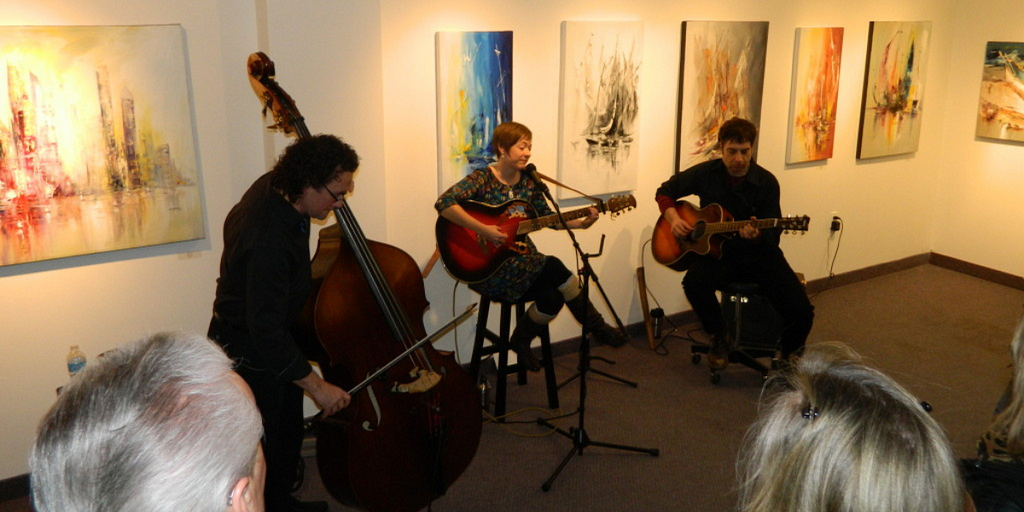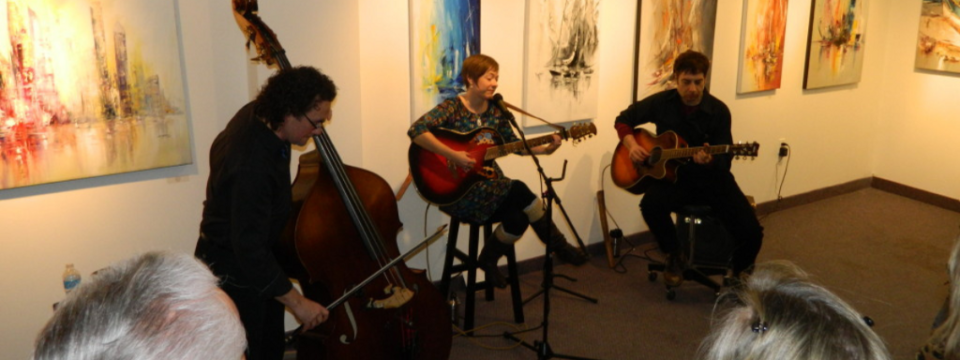Social Impact Heroes: Why & How Kim Crawford of Algonquin Arts Council Is Helping To Change Our World

Once you delegate, remember to follow up. There will always be posters with typos, tickets that don’t get distributed, and emails that didn’t quite make it where they should. Follow up with your team and keep tabs on things in a timely manner. That said, when you follow up, it’s critical to remember to be kind, even if things aren’t quite 100%. You can’t fire volunteers. You also can’t easily replace them. Always find a solution to the problem, instead of playing the blame game. Correct the poster yourself, if necessary (been there, done that).
As part of my series about “individuals and organizations making an important social impact,” I had the pleasure of interviewing Kim Crawford.
Kim is the past President of the Algonquin Arts Council and currently serves on the board of directors representing the Mineral Capital Concert Committee, under the charity’s treasurer position. The Algonquin Arts Council strives to contribute to the community’s cultural life by recognizing and supporting the local artists and cultural groups working within it. With this mission in mind, Kim and the Council’s Board amplify access to arts and culture within North Hastings, Ontario, Canada.
Thank you so much for joining us in this interview series! Can you tell us a story about what brought you to this specific career path?
When we first moved to the area, there was a plea in the local paper regarding the leadership of a performing arts group associated with the Algonquin Arts Council. It was in danger of folding, and new leadership was crucial. It sparked my interest, and I met with the chair of the committee before deciding that I wanted to get involved. The rest, as they say, is history.
I spent several years as chair of that group, acted as President of the Arts Council for many years, and eventually stepped back to take on the role of treasurer (the role that I currently hold).
Can you share the most interesting story that happened to you since you began leading your organization?
Not just one story, exactly, but how I am continuously meeting famous people. We have hosted David Francy, The Arrogant Worms, Leilah Gilday, Jane Bunnett, The Shuffle Demons, Carlos de Junco, and Rick Fines. I get a little star-struck when we have such great talent performing. They are always so gracious and have the most interesting stories to tell of their journey both in music and in life.
I find that well-known artists really enjoy performing in small towns because it is much more intimate. They have the opportunity to actually mingle with the audience and get to know their fans.
It has been said that our mistakes can be our greatest teachers. Can you share a story about your funniest mistake when you first started? Can you tell us what lesson you learned from that?
When I was chair of the Performing Arts Committee, we hosted quite a few famous acts. Every established performer or group has a rider on their contract, regarding their green room and what amenities they would like — especially regarding food and beverages. Very early on during my time as chair, one performer specified a particular craft beer and very specific artisan sandwich instructions. I spent a great deal of time sourcing the beer and the ingredients (and spent quite a few dollars in acquiring these), so everything would be just perfect.
He was very surprised to see it all in the green room and told me that part of the contract was only for the “hoity-toity big venues in the big city that have deep pockets”! He said a cheese plate and a Coke would have been fine. We had a good laugh about this though, and I learned to ask what each performer actually wanted before losing my mind trying to search for the impossible!
Can you describe how you or your organization is making a significant social impact?
Bancroft and the surrounding areas are very rural and have a small population. There are limited cultural activities in the area. Our Council and the groups we represent provide cultural outlets and experiences for citizens that they would otherwise not be able to access. We also pride ourselves on inclusivity and accessibility for everyone. We welcome everyone from youth to seniors as committee members, volunteers, and to be a part of our audience. We also maintain a close relationship with our local community integration association and welcome participation from those with intellectual and physical disabilities.
Can you tell us a story about a particular individual who was impacted or helped by your cause?
I would have to say, my own daughter. She was eight years old when we moved to the area and loved singing and theatre. She was supported and encouraged to perform and grow her talent by local theatre groups, our community choir, and many musical experiences throughout her teenage years — from performing in local theatre productions and concerts to open mic nights and high school events.
After going to college and university, she is now a professional opera singer, recently placing second at the Canadian Opera Company’s Centre Stage competition in November. She credits much of her success to the support she received growing up through opportunities provided here by the member groups of the Algonquin Arts Council and beyond.
Are there three things the community, society, and politicians can do to help you address the root of the problem you are trying to solve?
We need more volunteers in all of our groups. Volunteer burnout is a big issue, and fresh leadership is needed to re-energize our organization. Collaboration between local not-for-profit arts groups would be helpful to work together toward the common goal of fostering the love of arts in our community. Of course, financial support is needed from local government and politicians to acknowledge the value of arts within our communities.
How do you define “Leadership”? Can you explain what you mean or give an example?
Leadership is helping direct an organization in the best possible way, while acknowledging and valuing the input of everyone involved. It is collaboration at its best — discussion, planning, gathering ideas, and taking action as needed with someone serving as the leader who is steering the ship. It also involves the ability to delegate; not everything needs action by the leader. Empowering members to take on various roles and responsibilities is the best kind of leadership.
For example, one of our member groups was struggling and on the verge of possibly folding, with a very top-down leadership approach. Consequently, members were feeling excluded from the collective. New leadership brought a huge change in style and pace, which ultimately ended up saving the group. New roles and responsibilities were developed and assigned, a much more democratic process was put in place, and now the group is thriving again. Members feel engaged and valued, while allowing the executive team to provide strong leadership and guidance.
What are your “5 things I wish someone told me when I first started” and why? Please share a story or example for each.
As I said, don’t try to do everything yourself — delegate! At the very first event I hosted, I almost caved under the pressure of all the details to juggle. Never again will I do that!
Once you delegate, remember to follow up. There will always be posters with typos, tickets that don’t get distributed, and emails that didn’t quite make it where they should. Follow up with your team and keep tabs on things in a timely manner. That said, when you follow up, it’s critical to remember to be kind, even if things aren’t quite 100%. You can’t fire volunteers. You also can’t easily replace them. Always find a solution to the problem, instead of playing the blame game. Correct the poster yourself, if necessary (been there, done that).
Never forget to celebrate your success and reward your team with a fun post-event wrap-up. This is the best time! I have been part of several cast parties and concert debriefing gatherings, usually involving food and drink. Enjoy the afterglow of all your team’s hard works and the efforts you all put into pulling off such a great event. That said, be patient and inclusive — it takes all kinds of personalities to make a successful team. There is almost always someone who rubs you the wrong way, yet they are often one of the most productive members of the team. Keep an open mind and work together. You don’t have to like everyone, and they may not like you (and that’s okay).

You are a person of enormous influence. If you could inspire a movement that would bring the most amount of good to the most amount of people, what would that be? You never know what your idea can trigger. 🙂
Universal Free Music, a program where musicians would still get paid to perform, but the audience would be able to experience the performance in-person for free. Ideally, this would also include opportunities for audience members to interact with the musicians and various instruments.
Can you please give us your favorite “Life Lesson Quote”? Can you share how that was relevant to you in your life?
“Just Do It.” So often we procrastinate and feel that we aren’t worthy or qualified, perhaps even that we’re not the best choice for something. Just do it anyway. Take a risk and jump in — it will be alright!
If I hadn’t answered that ad in the local paper 15 years ago, I wouldn’t be a part of this interview! I am by nature a very shy person, which always surprises people, but I can honestly say that I have never regretted stepping out and taking a chance on something new.
Is there a person in the world, or in the US with whom you would like to have a private breakfast or lunch with, and why? He or she might just see this, especially if we tag them. 🙂
Michael Bublé. He is inspiring yet humble with his talent and life’s challenges.
How can our readers further follow your work online?
We are in the process of updating our website, but you can find us at www.algonquinarts.ca.
This was very meaningful. Thank you so much. We wish you only continued success with your great work!
Thank you for the opportunity to share our stories. It was a pleasure.
Social Impact Heroes: Why & How Kim Crawford of Algonquin Arts Council Is Helping To Change Our… was originally published in Authority Magazine on Medium, where people are continuing the conversation by highlighting and responding to this story.
